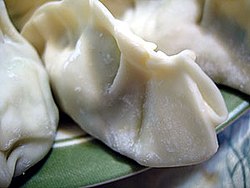餃子
See also: 饺子
Chinese
| dumplings with meat filling | child; son; (noun suffix) child; son; (noun suffix); small thing; seed; egg; 1st earthly branch; 11 p.m.–1 a.m., midnight | ||
|---|---|---|---|
| trad. (餃子) | 餃 | 子 | |
| simp. (饺子) | 饺 | 子 | |
Pronunciation
- Mandarin
- (Standard)
- (Chengdu, Sichuanese Pinyin): jiao3 zi3-2
- (Dungan, Cyrillic and Wiktionary): җёзы (ži͡ozɨ, II-I)
- Cantonese (Jyutping): gaau2 zi2
- Mandarin
- (Standard Chinese)
- Hanyu Pinyin:
- Zhuyin: ㄐㄧㄠˇ ˙ㄗ
- Tongyong Pinyin: jiǎozi̊h
- Wade–Giles: chiao3-tzŭ5
- Yale: jyǎu-dz
- Gwoyeu Romatzyh: jeau.tzy
- Palladius: цзяоцзы (czjaoczy)
- Sinological IPA (key): /t͡ɕi̯ɑʊ̯²¹⁴ d͡z̥z̩⁴/
- Homophones:
[Show/Hide] 角子
餃子/饺子
- (Chengdu)
- Sichuanese Pinyin: jiao3 zi3-2
- Scuanxua Ladinxua Xin Wenz: giaoz
- Sinological IPA (key): /t͡ɕiau⁵³ t͡sz̩⁵³⁻²¹/
- (Dungan)
- Cyrillic and Wiktionary: җёзы (ži͡ozɨ, II-I)
- Sinological IPA (key): /t͡ɕiɔː⁵¹ t͡sz̩²⁴/
- (Note: Dungan pronunciation is currently experimental and may be inaccurate.)
- (Standard Chinese)
- Cantonese
- (Standard Cantonese, Guangzhou–Hong Kong)+
- Jyutping: gaau2 zi2
- Yale: gáau jí
- Cantonese Pinyin: gaau2 dzi2
- Guangdong Romanization: gao2 ji2
- Sinological IPA (key): /kaːu̯³⁵ t͡siː³⁵/
- (Standard Cantonese, Guangzhou–Hong Kong)+
Noun
(deprecated template usage) 餃子
Hyponyms
Derived terms
Lua error in Module:zh/templates at line 32: This template has been deprecated. Please use Template:col3 instead.
Japanese

| Kanji in this term | |
|---|---|
| 餃 | 子 |
| ぎょう Hyōgai |
ざ Grade: 1 |
| irregular | |
Alternative forms
Etymology
Borrowed from Chinese 餃子/饺子 (jiǎozi),[1][2][3] possibly from a dialectal Mandarin reading giaozi.
Pronunciation
- Lua error in Module:ja-pron at line 89: Parameter "yomi" is not used by this template.
Noun

- gyoza: a kind of dumpling or potsticker with a thin skin, traditionally made with minced pork and then fried, boiled, or steamed
Derived terms
Derived terms
References
- ^ Matsumura, Akira, editor (2006), 大辞林 [Daijirin] (in Japanese), Third edition, Tokyo: Sanseidō, →ISBN
- ^ Matsumura, Akira (1995) 大辞泉 [Daijisen] (in Japanese), First edition, Tokyo: Shogakukan, →ISBN
- ^ NHK Broadcasting Culture Research Institute, editor (1998), NHK日本語発音アクセント辞典 [NHK Japanese Pronunciation Accent Dictionary] (in Japanese), Tokyo: NHK Publishing, Inc., →ISBN
Categories:
- Mandarin terms with audio links
- Mandarin terms with homophones
- Chinese lemmas
- Mandarin lemmas
- Sichuanese lemmas
- Dungan lemmas
- Cantonese lemmas
- Chinese nouns
- Mandarin nouns
- Sichuanese nouns
- Dungan nouns
- Cantonese nouns
- Chinese terms with IPA pronunciation
- Chinese terms spelled with 餃
- Chinese terms spelled with 子
- Beginning Mandarin
- zh:Foods
- Japanese terms spelled with 餃
- Japanese terms spelled with 子
- Japanese terms read with irregular kanji readings
- Japanese terms borrowed from Chinese
- Japanese terms derived from Chinese
- Japanese lemmas
- Japanese nouns
- Japanese terms with multiple readings
- Japanese terms spelled with hyōgai kanji
- Japanese terms spelled with first grade kanji
- Japanese terms with 2 kanji
- ja:Foods

